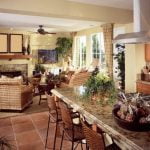Are you longing for a touch of adventure and wanderlust within the comforts of your own home? Look no further than the rising trend of Home Away Decor.
This concept has been gaining momentum in interior design, offering a unique and eclectic way to infuse global influences, cultural experiences, and natural elements into the home. From color palettes inspired by far-off destinations to furniture pieces sourced from different corners of the world, Home Away Decor allows homeowners to create a space that reflects their love for travel and exploration.
In this article, we will explore the concept of Home Away Decor and delve into why it has become such a popular trend in interior design. We will also provide guidance on finding inspiration for this aesthetic, choosing the right color palette, incorporating textures and fabrics, mixing and matching furniture pieces, adding global art and decor, bringing nature indoors, and adding personal touches for a truly unique and personalized home decor theme.
Whether you’re an avid traveler or simply someone with an appreciation for diverse cultures and natural beauty, Home Away Decor offers endless possibilities for creating a one-of-a-kind living space that evokes feelings of wanderlust and adventure.
As more homeowners seek to infuse their living spaces with elements that remind them of their favorite travel destinations or reflect their multicultural experiences, the appeal of Home Away Decor continues to grow. By embracing this trend, individuals can transform their homes into retreats that feel like tranquil escapes while still being rooted in comfort and personal style.
Join us as we embark on an exploration of how Home Away Decor can elevate your living space into a global sanctuary that speaks to your sense of adventure and appreciation for diverse influences.
Finding Inspiration
When it comes to creating a home away decor, finding inspiration from various sources is key to achieving the desired aesthetic. Travel experiences, cultural influences, and nature can all serve as valuable sources of inspiration for bringing a global and eclectic feel to your home decor.
One of the most significant sources of inspiration for a home away decor is travel experiences. Whether it’s a memorable trip abroad or simply exploring different cities within your own country, travel allows us to immerse ourselves in new cultures, landscapes, and architectural styles. Drawing inspiration from these experiences can lead to unique and personalized decor that reflects your love for adventure and exploration.
Cultural influences also play a crucial role in shaping the aesthetic of a home away decor. Whether it’s the vibrant colors of Indian textiles, the intricate patterns of Moroccan tiles, or the simplicity of Japanese design, incorporating elements from diverse cultures can add depth and richness to your home decor. Consider integrating cultural artifacts, artwork, or traditional crafts into your space to capture the essence of different cultures.
In addition to travel and cultural influences, nature can also be a powerful source of inspiration for creating a home away decor. From the serene beauty of coastal landscapes to the lush greenery of tropical forests, nature offers a wealth of visual stimuli that can be translated into interior design.
Consider incorporating natural materials like rattan, jute, or raw wood furniture into your decor, as well as adding indoor plants and botanical prints to bring an organic element into your home. Overall, drawing inspiration from travel experiences, cultural influences, and nature can help you create a unique and personal home away decor that reflects your adventurous spirit and love for global aesthetics.
Choosing the Right Color Palette
When creating a home away decor, choosing the right color palette is essential in establishing the desired aesthetic and ambiance. The colors used in a space can evoke different emotions and set the tone for the entire design. For a home away decor, drawing inspiration from travel experiences, cultural influences, and natural landscapes can help determine the perfect color scheme.
One way to select the ideal color palette for a home away decor is to consider the colors prevalent in a favorite travel destination. Whether it’s the warm terracotta tones of a Mediterranean village or the serene blues of a coastal paradise, these hues can serve as a starting point for creating an environment that feels like an escape without leaving home.
Another source of inspiration for selecting colors for your home away decor is nature itself. Incorporating earthy tones, lush greens, and calming blues can bring elements of the outdoors inside and create a soothing and inviting atmosphere.
When choosing the right color palette for your home away decor, it’s important to consider how these colors will interact with each other in different areas of your home. Using tools such as color wheels and swatches can help in determining which hues complement each other best and create a cohesive design scheme.
| Home Away Decor Color Palette | Example Hues |
|---|---|
| Coastal Escape | Sky Blue, Sandy Beige, Seafoam Green |
| Bohemian Wanderlust | Terracotta Red, Mustard Yellow, Emerald Green |
| Tropical Paradise | Vibrant Coral, Leafy Green, Sunshine Yellow |
Incorporating Textures and Fabrics
When it comes to creating a home away decor, textures and fabrics play a crucial role in achieving the desired aesthetic. The use of different textures and fabrics can help evoke the feeling of being in a different place or culture, adding depth and visual interest to the interior design.
Importance of Textures and Fabrics
Textiles, such as rugs, throws, and pillows, can instantly transform a space and add warmth. Incorporating natural materials like jute, bamboo, or rattan can bring an earthy and organic feel to your home decor. Additionally, mixing different textures like smooth glass with rough wood or soft velvet with coarse burlap can create a multi-dimensional look that is characteristic of a home away decor.
Ways to Incorporate Them Into the Design
One way to incorporate textures and fabrics into your home away decor is by layering different textiles throughout the space. Consider adding a variety of throw pillows in varying patterns and textures to your sofa or bed. Additionally, consider incorporating woven baskets for storage or displaying textured pottery on shelves. Another way to add texture is through window treatments; consider using curtains with natural fibers or adding a bamboo shade for an authentic touch.
By paying attention to textures and fabrics in your interior design, you can truly transform your space into a home away from home. Whether it’s through incorporating natural materials or layering different textiles, these elements play a key role in creating an inviting atmosphere that reflects the homeowner’s personal style and influences from around the world.
Mixing and Matching Furniture
When it comes to creating a home away decor, mixing and matching furniture is key to achieving a cohesive yet eclectic look. This approach allows for the incorporation of diverse styles, eras, and materials, which can help in reflecting the homeowner’s travel experiences and cultural influences. By blending different furniture pieces, it is possible to create a unique and personalized space that feels like a curated collection of items from around the world.
Balance Different Styles and Eras
One way to successfully mix and match furniture for a home away decor is by balancing different styles and eras. For instance, pairing a vintage wooden dining table with modern acrylic chairs can create an interesting juxtaposition that adds visual interest to the space. Additionally, integrating furniture pieces with varying aesthetic influences, such as Scandinavian minimalism or Moroccan-inspired designs, can contribute to the overall eclectic vibe.
Consider Scale and Proportions
It’s important to consider scale and proportions when mixing and matching furniture for a home away decor. While it’s great to incorporate diverse pieces, they should still work harmoniously within the space. For example, pairing an oversized sectional sofa with dainty mid-century side tables may result in an unbalanced look. Taking measurements and visualizing how different furniture items will fit together can help in achieving a well-proportioned arrangement.
Utilize Unifying Elements
Incorporating unifying elements, such as color or material, can help tie together disparate furniture pieces in a home away decor. Using consistent colors or materials across various items can create a sense of cohesion while still allowing for diversity in style. For instance, using brass accents throughout different furniture pieces or opting for a consistent color palette can bring together the mix of furnishings into a unified design concept.
By carefully considering balance, scale, proportions, and unifying elements when mixing and matching furniture pieces for a home away decor, homeowners can achieve an eclectic yet cohesive look that reflects their individual tastes and global inspirations.
Adding Global Art and Décor
When it comes to creating a home away decor, incorporating global art and décor can have a big impact on achieving the desired aesthetic. Whether you’re drawn to the vibrant colors of Indian textiles, the intricate patterns of Moroccan ceramics, or the minimalist beauty of Japanese pottery, there are endless possibilities for bringing the world into your home through art and decor.
Here are some specific pieces and styles to consider when adding global art and decor to your space:
- Textiles: Consider adding a beautiful handwoven rug from India, a colorful tapestry from Mexico, or a set of batik throw pillows from Indonesia to infuse your space with texture and cultural flair.
- Wall Art: Look for unique pieces of art that reflect different cultures, such as African masks, Japanese woodblock prints, or Persian miniature paintings. These can serve as focal points in your home away decor and add personality to your space.
- Ceramics and Pottery: Explore the world of international ceramics and pottery, whether it’s a set of traditional Moroccan tiles for a kitchen backsplash, a collection of Chinese blue-and-white vases for a living room display, or handmade clay bowls from South America for serving meals with global flair.
By carefully selecting global art and decor pieces that speak to you personally and fit within your overall design scheme, you can create an eclectic yet cohesive home away aesthetic that is both visually stunning and deeply meaningful. Remember that the key is not just in finding beautiful objects from around the world but also in integrating them thoughtfully into your space to tell a story about who you are and where you’ve been.
Bringing Nature Indoors
As the trend of home away decor continues to gain popularity in interior design, incorporating natural elements into the home has become a key aspect of achieving this aesthetic. Whether inspired by travel experiences or cultural influences, bringing nature indoors adds a sense of tranquility and connection to the environment. Here are some ways to use natural elements to enhance the home away decor theme:
- Plants: Incorporating greenery into the home not only adds a pop of color but also brings life and freshness to any space. Consider adding a variety of houseplants, such as succulents, ferns, or air plants, to different areas of your home.
- Natural Materials: Utilize materials like wood, stone, jute, and rattan in furniture pieces and decor accents to bring an earthy and organic feel to your space. Opt for wooden coffee tables, stone vases, or woven baskets for a touch of natural beauty.
- Organic Shapes: Embrace the beauty of organic shapes found in nature by choosing furniture and decor with curved lines and irregular forms. Look for items like round mirrors, irregularly shaped ceramics, or driftwood sculptures to add visual interest and a natural touch.
By incorporating these natural elements into your home away decor, you can create a peaceful retreat that is both beautiful and inviting. Whether you draw inspiration from lush forests, sandy beaches, or rocky landscapes, bringing nature indoors allows you to infuse your living space with the natural beauty that resonates with you.
Final Touches and Personalization
In conclusion, creating a home away decor is all about blending personal experiences, cultural influences, and global elements to make a space feel uniquely reflective of the homeowner’s personality. It’s about bringing together inspiration from travels, nature, and different cultures to curate a design that feels welcoming and authentic.
By incorporating a carefully chosen color palette, textures and fabrics, mixed furniture pieces, global art and decor, natural elements, and personal touches, homeowners can transform their living spaces into a true reflection of their individuality.
The beauty of home away decor lies in its ability to transport inhabitants to different parts of the world without ever leaving their homes. Whether it’s the warm terracotta tones reminiscent of Mediterranean villas or the vibrant textiles inspired by traditional African patterns, each element tells a story and adds richness to the overall design.
By considering every detail from the color on the walls to the artwork on display, homeowners can create an atmosphere that evokes a sense of wanderlust and comfort.
Ultimately, creating a home away decor is an opportunity for homeowners to escape within the confines of their own homes. By infusing personal experiences and memories into the design process, individuals can craft living spaces that go beyond mere aesthetics to embody their unique story. Whether it’s through handpicked souvenirs from travels or heirloom furniture passed down through generations, every addition contributes to making the home truly feel like a reflection of its inhabitants’ lives and experiences.

I’m thrilled to be your companion on this exciting journey through the world of home decor and design. With a passion for turning houses into homes and a keen eye for the finer details, I’m here to help you transform your living spaces into beautiful, functional, and meaningful havens.





